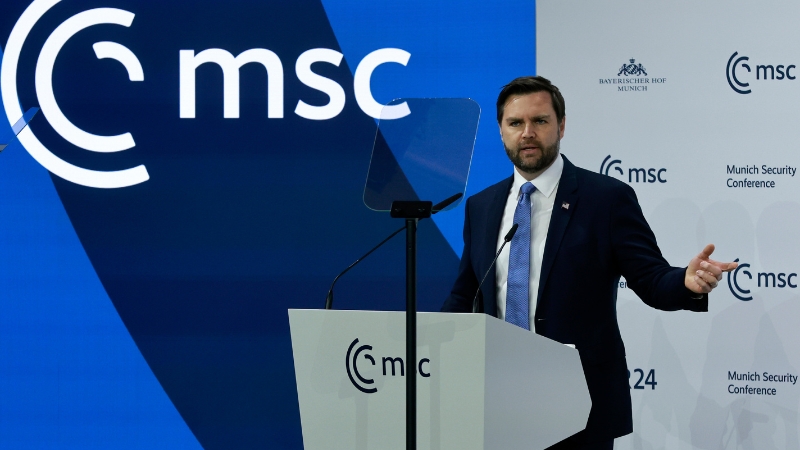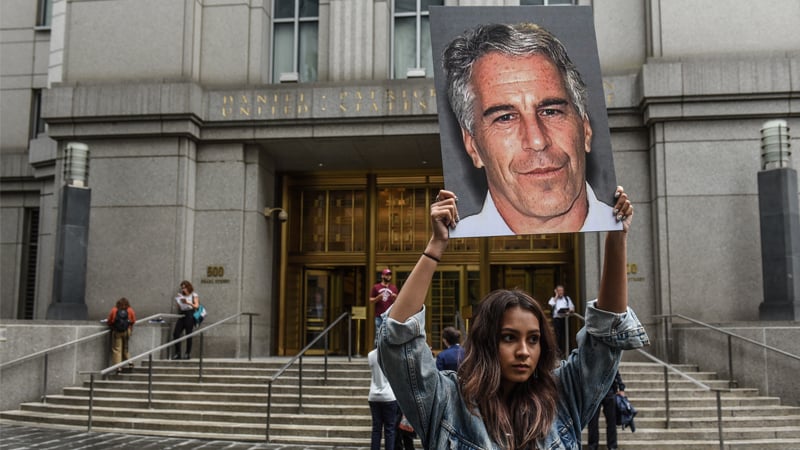 Image Credit: Johannes Simon / Stringer / Getty Images
Image Credit: Johannes Simon / Stringer / Getty Images At the Munich Security Conference back in March, Vice President JD Vance shocked Europe’s “great and good” when he declared that they themselves and not any external enemy—not Russia or China or Iran—are the greatest threat to the continent’s future.
Europe, Vance said, is turning away from its fundamental values, the values that made it great, the envy of the world. If Europe wants to reaffirm those values, to step off the dangerous path chosen for it by its leaders and become great again, the United States under President Donald Trump will be a willing friend and ally. The United States will not, however, provide support for a European elite that crushes freedom of speech and political dissent, and that destroys its own nations through mass immigration nobody voted for but also can’t vote against either.
Everything Vance said could have been predicted from remarks he and the President had made long before the Conference, but that made his criticisms no less shocking as a result. Europe’s elite are not used to being told the truth—especially not to their faces, in the full glare of the world’s media. On the campaign trail, Vance had even suggested an incoming Trump administration could sanction Europe for its transgressions by withdrawing from NATO completely.
A commitment to freedom of speech and to other fundamental American values is central to the second Trump presidency. On his first day in office, President Trump set the tone by issuing an Executive Order titled, “Restoring Freedom of Speech and Ending Federal Censorship.”
What’s perhaps not appreciated enough is just how tied up freedom of speech in the US is with freedom of speech in Europe. It’s not that censorship in Europe imperils freedom in the US in some vague sense, because the US and Europe are part of the same civilisation, with shared origins, culture and blood. It’s that the European censorship regime is directly impacting what Americans can say back at home. Europeans are censoring Americans, and what’s worse, they’re doing it with the help of American companies.
There’s no clearer or more dangerous example of this than the EU’s 2022 Digital Services Act, which is leading to active censorship of what Americans can say on the world’s largest and most important social-media platforms, including X. I owe much of the analysis that follows to a very good essay by Joel Rosenthal in the latest edition of the Claremont Review of Books.
The EU and the US took fundamentally opposing positions on online freedom of speech well over a decade ago. As early as 1996, US lawmakers decided that an online platform could not be held responsible for the speech of its users. Fast forward to 2016, and European lawmakers decided to take the reverse approach. In Europe, online platforms would be held responsible—indeed would bear special responsibility—for what users posted on them.
This led to a piece of legislation in Germany called the Network Enforcement Act, in 2017, often abbreviated to “NetzDG.” In an instant, Germany had essentially decided that the entire internet should be subject to German law.
Platforms objected to the new burden of censorship that was imposed on them, knowing that it would be anticipatory and extensive. After all, if you’re going to be held responsible for what your users post, it’s sensible to start actively monitoring their posts and removing content that might fall foul of the authorities before they ever get involved. But the social-media giants gave in and complied anyway.
This is why some Twitter users, myself included, started receiving strange notices telling us our posts were in contravention of German law and sometimes threatening sanctions, up to and including banning, if offending posts weren’t removed.
Who cares about German law? we thought, and carried on shitposting.
NetzDG remained in force until 2022, when the Digital Services Act was passed. This new law had an EU-wide effect. Instead of the whole internet being subject to German law, now it’s subject to EU law—to the law of all 27 member states—and non-compliance is punishable by catastrophic fines of up to 6% of a company’s global turnover.
Member states can flag posts for censorship and so can the European Commission itself. National authorities and the Commission can name “trusted flaggers” whose reports are expedited and given extra weight.
But the DSA goes further. On top of requiring internet platforms to censor speech that’s illegal in the EU, they must also act against mis- and disinformation—information that is not illegal but simply decided by the authorities in Europe, for whatever reason, to be “harmful.”
We all know what this looks like, of course—the crusade against harmful mis- and disinformation—from the pandemic.
And for all intents and purposes, Americans might as well still be stuck in the dark days of the pandemic, under the Biden presidency, before Elon Musk took over Twitter, because this censorship regime is still in full swing. The only real difference is, it’s not as overt. But it’s still there, and in many ways it’s worse, because it’s even less clear what’s going on than it was before.
Yes, people aren’t getting banned in the same way as they were, but they are having their reach limited. They’re simply being made invisible. As Elon Musk himself put it, not long after he bought Twitter in 2022, “freedom of speech isn’t freedom of reach.” He said this as a direct reassurance for the censors in Europe.
Now, instead of outright banning people or putting them on a three-strikes-and-you’re-out warning, posts that contain “harmful” content are simply made to disappear by means of algorithmic tweaks. Nobody sees them, nobody is “hurt.” This is enough to satisfy the EU.
Safety labels are attached to posts that are flagged, but unlike the labels that appeared during the pandemic, these are only visible to internal moderators. That means we don’t even know what is being flagged or why.
We can get some sense of the scale of the operation, however. Platforms including X now have to provide regular “transparency reports” to update the EU about their compliance with the DSA. X’s April 2024 report shows that in the previous five months, the platform took enforcement action on 226,350 of 238,108 items reported to it by the EU. That’s 95%—near total compliance.
This is far from the full story. These reports only contain items reported by the EU. They don’t include items reported by individuals, organizations or government “trusted flaggers,” nor indeed do they contain reference to material that’s automatically repressed by X’s own algorithm. The mass of censorship below the water, where we can’t see, may be far larger than the mass above it.
The reports also give a sense—again, only a sense—of how much this censorship touches Americans specifically. The April 2024 report states that 90% of X’s 1,726 content moderators are primarily English speakers. So the vast majority of the censorship on X in compliance with EU law is in English, despite barely 1% of the EU population speaking English as their first language.
Clearly, this is unacceptable. Americans are having their freedom of speech curtailed in the digital public square—which is the actual public square—according to the laws of foreign nations, with the collusion of American companies. It’s happening thousands of times a month, maybe tens or hundreds of thousands of times a month.
So what can be done?
In his essay for the Claremont Review of Books,Rosenthal outlines a number of different options.
American companies should not have to pay fines at the behest of the EU for not censoring Americans’ speech. These fines could be challenged at the World Trade Organization. This, Rosenthal argues, is a minimum, and it’s hard to disagree. If American companies aren’t afraid of fines, they have no good reason to censor Americans.
But what if that didn’t work? Well, America could make it illegal for American companies to comply with the EU in restricting Americans’ speech. As Rosenthal notes, the First Amendment prevents Congress from making any law abridging freedom of speech, “but now it needs to enact a specific law protecting freedom of speech from foreign interference.”
Why not create a mirror image of the European Commission and its powers under the DSA? Give federal authorities the power to promote freedom of speech online, and also give them the investigatory powers allowed by the DSA. Allow federal authorities to seize company records, investigate requests for user data from the EU and demand access to algorithms to see what’s really going on under the hood.
And if the EU won’t back down, companies will simply have to choose: America or the EU. American companies shouldn’t even have the option to censor and appease foreign nations or blocs that oppose American values.
The primary beneficiaries would, of course, be Americans, but there would be benefits for Europeans too. Europeans are labouring under a near-universal tyranny—genuinely—and they need some help to tip the scales against their governments, which are jailing people for tweets about foreign rape gangs and the disastrous effects of their misguided and malevolent policies of social engineering through demographic change.
In this case, America First at home could also be America First abroad: an assertion of the universal benefits of American values. Everyone would win—everyone except Europe’s crooked, complacent elite, that is. But who cares about them anyway?
🚨MASSIVE TERROR ALERT: Top Iranian Mullah Issues Death Fatwa Against Trump/America!


